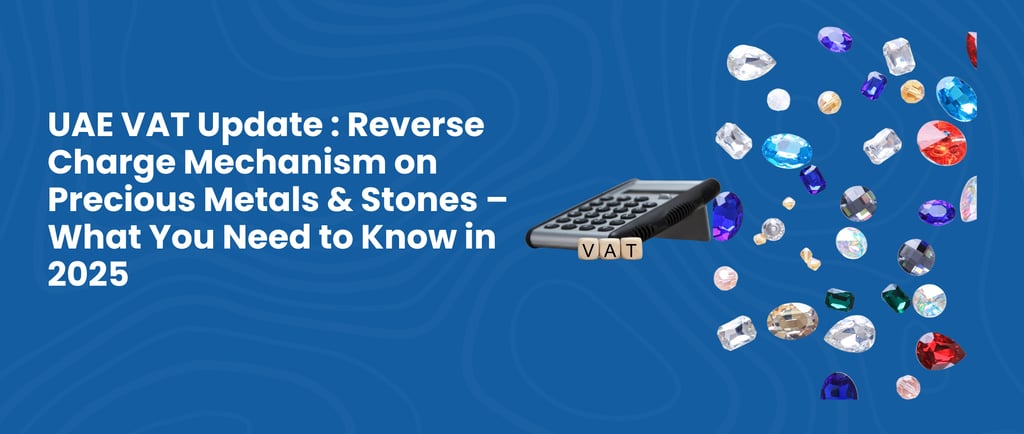UAE VAT Update: Reverse Charge Mechanism on Precious Metals & Stones – What You Need to Know in 2025
The UAE's 2025 VAT update extends the Reverse Charge Mechanism to a wider range of precious metals and stones, easing compliance and improving cash flow for businesses.
7/29/20253 min read


UAE VAT 2025 Update: How the Reverse Charge Mechanism is Changing the Game for Precious Metals & Stones Businesses
The UAE continues to solidify its position as a global trade leader, especially in the precious metals and gemstones sector. From gold markets in Dubai to high-end jewellers across Abu Dhabi and Sharjah, this industry forms a critical part of the national economy. In a major policy shift, Cabinet Decision No. (127) of 2024 introduces new VAT treatment under the Reverse Charge Mechanism (RCM) effective from 15th February 2025.
This update significantly reshapes how Value Added Tax (VAT) applies to transactions involving gold, silver, diamonds, and other high-value materials. Whether you're a wholesaler, importer, or retailer, understanding the changes is essential for remaining compliant and cash-flow efficient.
What Is the Reverse Charge Mechanism (RCM) and What’s New?
Traditionally, the seller was responsible for charging and remitting VAT in B2B transactions. However, under the RCM, that responsibility shifts to the buyer. This change was already applied selectively under Cabinet Decision No. (25) of 2018, especially for gold and diamonds between registered businesses.
The 2024 update expands this mechanism across a broader spectrum of materials, including natural and synthetic diamonds, pearls, rubies, sapphires, emeralds, and jewellery that predominantly consists of these components. This means that in qualifying transactions, the seller no longer charges VAT, and instead, the buyer accounts for VAT in their return.
Understanding the Product Scope
The reform doesn’t apply to all transactions involving luxury items. Businesses must determine whether the goods qualify under the expanded RCM category. This includes distinguishing between items sold as investment-grade (like bullion with 99% purity or above) and those sold for industrial or decorative use, which may still carry standard VAT treatment if not covered under the new RCM rule.
What Sellers Need to Do
If you're a seller in this space, you must:
Stop charging VAT on eligible B2B sales falling under the RCM.
Ensure the buyer is VAT-registered.
Keep proper documentation including tax invoices, the buyer's VAT number, and detailed item descriptions.
Regularly review your product portfolio to determine whether items are classified under the new RCM coverage.
What Buyers Must Comply With
Buyers now shoulder the responsibility for VAT accounting. This means:
Calculating VAT on the transaction internally.
Declaring the VAT amount in their periodic FTA return.
Retaining supporting documents to prove proper VAT treatment and compliance.
Understanding which of their purchases are zero-rated versus those under standard VAT.
Why This Matters for Businesses in the UAE
This regulatory shift aims to streamline the VAT framework for the high-value commodities market. For businesses, it introduces much-needed clarity and reduces cash flow strain since VAT is no longer paid upfront to the seller.
However, it also puts the onus on both parties — particularly the buyer — to ensure meticulous compliance. With increased FTA scrutiny and penalties for incorrect filings, the importance of accurate documentation and proper VAT treatment cannot be overstated.
How ALWAHAT Supports You Through the Change
At ALWAHAT Accounts and Internal Audit Services, we guide businesses through every step of their VAT compliance journey. With extensive experience in high-value transactions, we provide:
Tailored VAT registration and advisory services.
Review and validation of documentation for RCM compliance.
Support in classifying goods correctly as investment or non-investment grade.
Assistance with FTA audit preparation and representation.
Our team works closely with clients in Dubai, Sharjah, and Abu Dhabi, ensuring your tax planning and compliance strategies are solid, up-to-date, and penalty-proof.
Need clarity on how this VAT update affects your business?
Contact ALWAHAT today — let’s ensure your accounting and tax setup aligns with the latest FTA regulations.
📞 +971 50 132 7005
📩 info@alwahataudit.com
🌐 www.alwahataudit.com
Disclaimer: This blog is for informational purposes only and does not constitute professional tax, financial, or legal advice. For specific guidance, please consult with certified professionals or refer directly to the UAE Federal Tax Authority (FTA).
Address
Faisal 2 Bldg, Office No 203, King Faisal St, Al Nad- Al Qasimia, Sharjah, UAE
Level 17, World Trade Center, Khalifa Bin Zayed, the first street- Abudhabi
Unit 32 -
4th Floor, AWR Properties - Al Fahidi Heights Office Tower, beside Central Mall ,near Sharaf DG metro station exit 4,Dubai ,U.A.E
Contacts
info@alwahataudit.com
+971589373943
We empower you to make well-informed decisions and successfully attain your financial objectives.


All copyrights reserved @Al-Wahat Accounts & Internal Audits | Designed - Abhijith.digital
Subscribe to our newsletter


